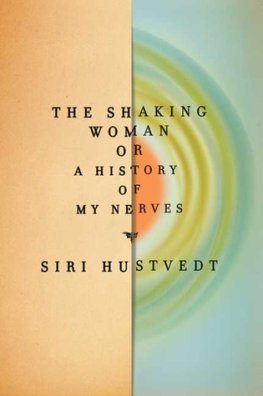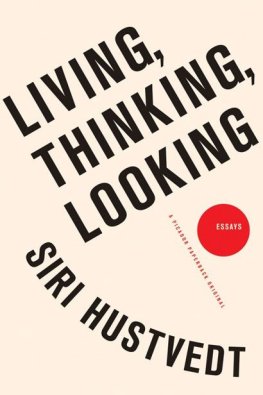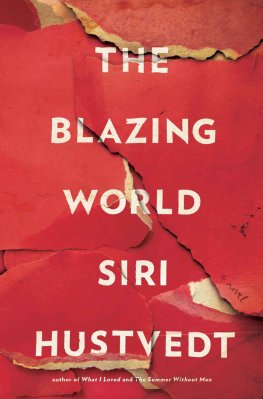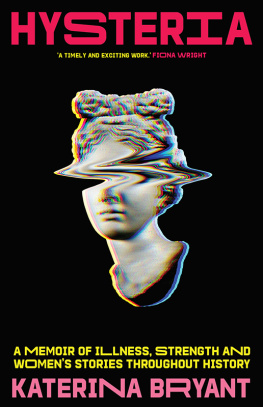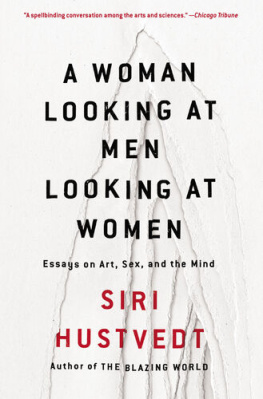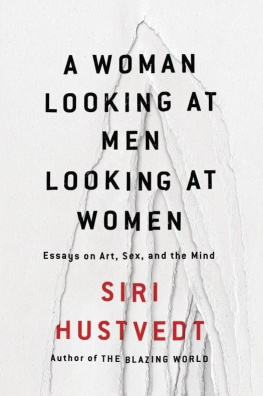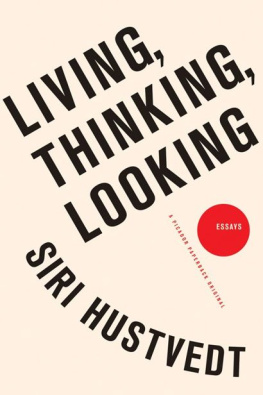Siri Hustvedt
The Shaking Woman or A History of My Nerves
I felt a Cleaving in my Mind
As if my Brain had split
I tried to match it Seam by Seam
But could not make it fit.
EMILY DICKINSON
THE SHAKING WOMAN OR A HISTORY OF MY NERVES
WHEN MY FATHER DIED, I was at home in Brooklyn, but only days before I had been sitting beside his bed in a nursing home in Northfield, Minnesota. Although he was weak in body, his mind remained sharp, and I remember that we talked and even laughed, though I cant recall the content of our last conversation. I can, however, clearly see the room where he lived at the end of his life. My three sisters, my mother, and I had hung pictures on the wall and bought a pale green bedspread to make the room less stark. There was a vase of flowers on the windowsill. My father had emphysema, and we knew he would not last long. My sister Liv, who lives in Minnesota, was the only daughter with him on the final day. His lung had collapsed for the second time, and the doctor understood that he would not survive another intervention. While he was still conscious, but unable to speak, my mother called her three daughters in New York City, one by one, so we could talk to him on the telephone. I distinctly remember that I paused to think about what I should say to him. I had the curious thought that I should not utter something stupid at such a moment, that I should choose my words carefully. I wanted to say something memorable an absurd thought, because my fathers memory would soon be snuffed out with the rest of him. But when my mother put the telephone to his ear, all I could do was choke out the words I love you so much. Later, my mother told me that when he heard my voice, he smiled.
That night I dreamed that I was with him and he reached out for me, that I fell toward him for an embrace, and then, before he could put his arms around me, I woke up. My sister Liv called me the next morning to say that our father was dead. Immediately after that conversation, I stood up from the chair where I had been sitting, climbed the stairs to my study, and sat down to write his eulogy. My father had asked me to do it. Several weeks earlier, when I was sitting beside him in the nursing home, he had mentioned three points he wanted me to take down. He didnt say, I want you to include them in the text you will write for my funeral. He didnt have to. It was understood. When the time came, I didnt weep. I wrote. At the funeral I delivered my speech in a strong voice, without tears.
TWO AND A HALF YEARS LATER, I gave another talk in honor of my father. I was back in my hometown, in Minnesota, standing under a blue May sky on the St. Olaf College campus, just beyond the old building that housed the Norwegian Department, where my father had been a professor for almost forty years. The department had planted a memorial pine tree with a small plaque beneath it that read, lloyd hustvedt (19222004). While Id been writing this second text, Id had a strong sensation of hearing my fathers voice. He wrote excellent and often very funny speeches, and as I composed I imagined that I had caught some of his humor in my sentences. I even used the phrase Were my father here today, he might have said Confident and armed with index cards, I looked out at the fifty or so friends and colleagues of my fathers who had gathered around the memorial Norway spruce, launched into my first sentence, and began to shudder violently from the neck down. My arms flapped. My knees knocked. I shook as if I were having a seizure. Weirdly, my voice wasnt affected. It didnt change at all. Astounded by what was happening to me and terrified that I would fall over, I managed to keep my balance and continue, despite the fact that the cards in my hands were flying back and forth in front of me. When the speech ended, the shaking stopped. I looked down at my legs. They had turned a deep red with a bluish cast.
My mother and sisters were startled by the mysterious bodily transformation that had taken place within me. They had seen me speak in public many times, sometimes in front of hundreds of people. Liv said she had wanted to go over and put her arms around me to hold me up. My mother said she had felt as if she were looking at an electrocution. It appeared that some unknown force had suddenly taken over my body and decided I needed a good, sustained jolting. Once before, during the summer of 1982, Id felt as if some superior power picked me up and tossed me about as if I were a doll. In an art gallery in Paris, I suddenly felt my left arm jerk upward and slam me backward into the wall. The whole event lasted no more than a few seconds. Not long after that, I felt euphoric, filled with supernatural joy, and then came the violent migraine that lasted for almost a year, the year of Fiorinal, Inderal, cafergot, Elavil, Tofranil, and Mellaril, of a sleeping-drug cocktail I took in the doctors office in hopes that I would wake up headache-free. No such luck. Finally, that same neurologist sent me to the hospital and put me on the antipsychotic drug Thorazine. Those eight stuporous days in the neurology ward with my old but surprisingly agile roommate, a stroke victim, who every night was strapped to her bed with a restraint sweetly known as a Posey, and who every night defied the nurses by escaping her fetters and fleeing down the corridor, those strange drugged days, punctuated by visits from young men in white coats who held up pencils for me to identify, asked me the day and the year and the name of the president, pricked me with little needles Can you feel this? and the rare wave through the door from the Headache Czar himself, Dr. C., a man who mostly ignored me and seemed irritated that I didnt cooperate and get well, have stayed with me as a time of the blackest of all black comedies. Nobody really knew what was wrong with me. My doctor gave it a namevascular migraine syndromebut why I had become a vomiting, miserable, flattened, frightened ENORMOUS headache, a Humpty Dumpty after his fall, no one could say.
My travels in the worlds of neurology, psychiatry, and psychoanalysis began well before my stint in Mount Sinai Medical Center. I have suffered from migraines since childhood and have long been curious about my own aching head, my dizziness, my divine lifting feelings, my sparklers and black holes, and my single visual hallucination of a little pink man and a pink ox on the floor of my bedroom. I had been reading about these mysteries for many years before I had my shaking fit that afternoon in Northfield. But my investigations intensified when I decided to write a novel in which I would have to impersonate a psychiatrist and psychoanalyst, a man I came to think of as my imaginary brother, Erik Davidsen. Brought up in Minnesota by parents very much like mine, he was the boy never born to the Hustvedt family. To be Erik, I threw myself into the convolutions of psychiatric diagnoses and the innumerable mental disorders that afflict human beings. I studied pharmacology and familiarized myself with the various classes of drugs. I bought a book with sample tests for the New York State psychiatric boards and practiced taking them. I read more psychoanalysis and countless memoirs of mental illness. I found myself fascinated by neuroscience, attended a monthly lecture on brain science at the New York Psychoanalytic Institute, and was invited to become a member of a discussion group devoted to a new field: neuropsychoanalysis.
In that group, neuroscientists, neurologists, psychiatrists, and psychoanalysts sought a common ground that might bring together the insights of analysis with the most recent brain research. I bought myself a rubber brain, familiarized myself with its many parts, listened intently, and read more. In fact, I read obsessively, as my husband has told me repeatedly. He has even suggested that my rapacious reading resembles an addiction. Then I signed up as a volunteer at the Payne Whitney Psychiatric Clinic and began teaching a writing class to the patients there every week. At the hospital, I found myself close to particular human beings who suffered from complex illnesses that sometimes bore little resemblance to the descriptions cataloged in the

